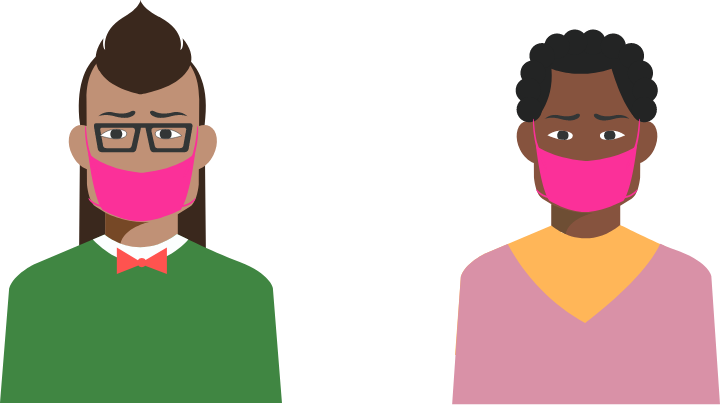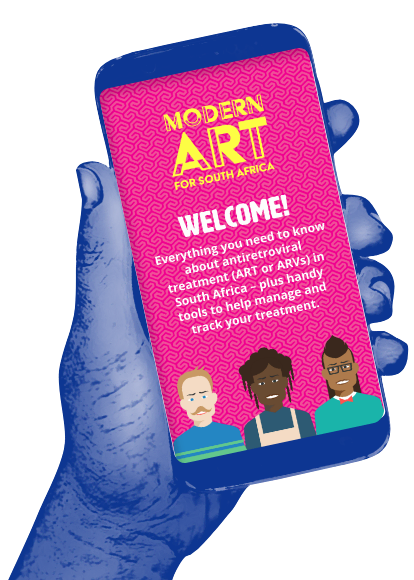-
What is COVID-19?
Coronavirus 2019 (COVID-19) is the name of the disease caused by the severe acute respiratory syndrome coronavirus 2 (SARS-CoV-2).
This is a new virus that is easy to catch and everyone is at risk. Most people will only have a mild infection that can be managed at home. Some people will not even have any symptoms.
As COVID-19 is a new virus, there is lots of research going on and we are learning more about it every day. But many things are still unknown, including about COVID-19 and HIV.
SOURCES for the information in this section:
-
What Are the Symptoms of Covid-19?
The main symptoms of are:
- A high temperature or fever: you feel hot to touch on your chest or back. You do not need to take your temperature. If you do have a thermometer, you have a fever if you temperature is 37.8 C and above.
- A new, continuous cough: coughing a lot for more than an hour, or three or more coughing episodes in 24 hours. If you usually have a cough, this might be worse than usual.
- Other possible symptoms: chills, shaking, sore throat, headache, diarrhoea, and loss of smell and taste might also be symptoms.
If you have these symptoms you should stay at home for at least seven days.
-
What are the danger signs?
Symptoms of severe illness include:
- Trouble breathing
- Pain or pressure in the chest that doesn’t go away
- Confusion
- Bluish lips or face
If you have these symptoms you should contact your doctor straight away.
-
Who is most at risk?
People at higher risk of becoming seriously ill with COVID-19 include those who are or have:
- 70 or older
- Pregnant
- A lung condition, such as asthma, COPD, emphysema or bronchitis
- Heart disease
- Diabetes
- Hypertension (high blood pressure)
- Kidney disease
- Liver disease (such as hepatitis)
- A condition of the brain or nerves (such as Parkinson’s disease, motor neurone disease, multiple sclerosis or cerebral palsy)
- A condition that means they have a high risk of infection
- Taking a medicine that can affect the immune system (such as steroids)
- Very obese (a BMI of 40 or above)
- An organ transplant
- Having chemotherapy or other cancer treatments
- Blood or bone marrow cancer (such as leukaemia, lymphoma or myeloma)
-
Are people with HIV at higher risk of COVID-19?
South African research found that people with HIV and COVID-19 have twice the risk of dying than HIV negative people.
But this risk was not nearly as high as that for older people and people with diabetes.
Some people with HIV might also have other risk factors for COVID-19, like diabetes, hypertension and obesity. So they could be at increased risk from COVID-19 for those reasons.
People with advanced HIV disease, poorly-controlled HIV, a low CD4 count* and high viral load and those who are not taking ART have an increased risk of infections and complications.
So it is likely they are also at higher risk of becoming seriously ill with COVID-19.
It is important to make sure your HIV and other health conditions are well-managed during the COVID-19 lockdowns and restrictions.
* Less than 200 cells/mm3 and even more so if less than 50 cells/mm3
-
What else is important for people living with HIV?
Everyone living with HIV needs to take their ARVs.
These will keep your immune system strong. You will be less at risk of infections, including COVID-19.
You should be able to pick up two or three months of ARVs at the clinic. This will mean that you do not need to go to the clinic so often and be in a crowded place.
-
How does someone catch COVID-19?
You can get COVID-19 from other people who have the virus. It can spread through small droplets from the nose or mouth when a person with COVID-19 coughs, sneezes, talks or breathes. You can catch COVID-19 if you breathe in these droplets.
The droplets also land on objects and surfaces. Other people can then catch COVID-19 by touching that surface and then touching their mouth, nose or eyes.
Or you might touch a place that someone with COVID-19 droplets on their hands has touched – like a door handle or a seat in a taxi – and then touch your mouth, nose or eyes.
-
How do we protect ourselves from COVID-19?
- Wash your hands often and thoroughly for at least 20 seconds with soap and water, particularly if you have been outside – this kills any virus that could be on your hands.
- You can also clean your hands with an alcohol-based hand sanitiser.
- Avoid touching your eyes, nose and mouth.
- Keep a distance of at least one-and-a-half metres between yourself and others (social distancing). If you are too close, you can breathe in droplets with COVID-19 virus from a person who has it.
- Avoid crowded places.
- Cover your mouth and nose with your bent elbow or a tissue when you cough or sneeze. Then throw away the used tissue immediately and wash your hands.
- Wear a mask to avoid infecting others.
-
Is there a test for COVID-19?
Yes.
To test for COVID-19 you will usually have a swab taken from your nose or the back of your throat. This is sent to a laboratory which runs a polymerase chain reaction (PCR) test. This is like an HIV test and looks for coronavirus genetic material.
Antibody tests might soon be introduced in South Africa. For these a blood sample will be taken. These tests look for antibodies to fight the virus. Antibody tests can tell if someone has already had COVID-19.
-
Is there a cure or a vaccine?
There is currently is no cure for COVID-19. There is also no proven vaccine.
There are drugs coming along that can improve the symptoms or shorten someone’s time being very ill.
A lot of research is going on in COVID-19. So things are likely to change over the next months and years, and we will keep you informed of the progress.
There are also no traditional medicines or Imbiza that work against COVID-19. As with HIV there are plenty of false claims.
Do not take any untested medicine unless it is given to you within a clinical trial.
-
Keep going!
Well done on completing this Learn More section!
Keen to keep learning? Check out these sections next.


